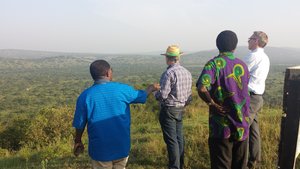Advertisement
Published: February 1st 2016

 KARUCO's Lookout
KARUCO's Lookout
ETI, Swedish & Tanzanian Partners**********
My colleague
@IsaacBolger recently sent me a
blogpost outlining how seductive it is for young (or any aged) westerners to believe they can swoop into other lands and solve problems. In my years doing this work I’ve heard (and most likely uttered) the phrase "if we can just…”
to start a sentence that ends with a relatively simplistic solution to a context that may or may not even be a problem. If a problem exists, it is likely not solvable with an “if we can just” sentence.
This week we did some community-based work to see where asked people about their current situation in relation to education, water, health, and agriculture. What we found in our survey was expected – there is illiteracy, challenging gender dynamics, and exploitation of small farmers present in the small communities in Karagwe district. There is also, however, a commitment to education, strong family networks, and a good supply of rain present. In short, tremendous challenges but strong social opportunities.
Enter the KARUCO vision. I had a wonderful week with Tanzanian, US,

 Taking 'The Survey'
Taking 'The Survey'
KARUCO Impact Study Baselineand Swedish colleagues coming to understand what is being built in Karagwe. In our conversations about KARUCO, what I heard was refreshing. The KAD team is envisioning a university that can act as a contributor to society – one that focuses on innovation and community engagement. Never once did I hear the simplistic words “if we can just build the university all will be well.” In truth, poverty, exploitation, and the economics of agriculture are very complicated issues.
I came away from this week with an appreciation for my colleagues and their realization that not everything has a quick solution, but institutions can be developed to dig into the work. My small part of this process was to begin to understand where communities are in terms of education, water access, agricultural sustainability, and general health. It may take time for KARUCO to have an impact in these areas, but to me a long-term, thoughtful, sustainable, community-engaged approach is better than one that starts with “if we can just do “a” then “b” will come. Thank you, colleagues, for your vision and support of our work this week!
Advertisement
Tot: 0.175s; Tpl: 0.01s; cc: 9; qc: 48; dbt: 0.0772s; 1; m:domysql w:travelblog (10.17.0.13); sld: 1;
; mem: 1.2mb

 KARUCO's Lookout
KARUCO's Lookout
 Taking 'The Survey'
Taking 'The Survey'